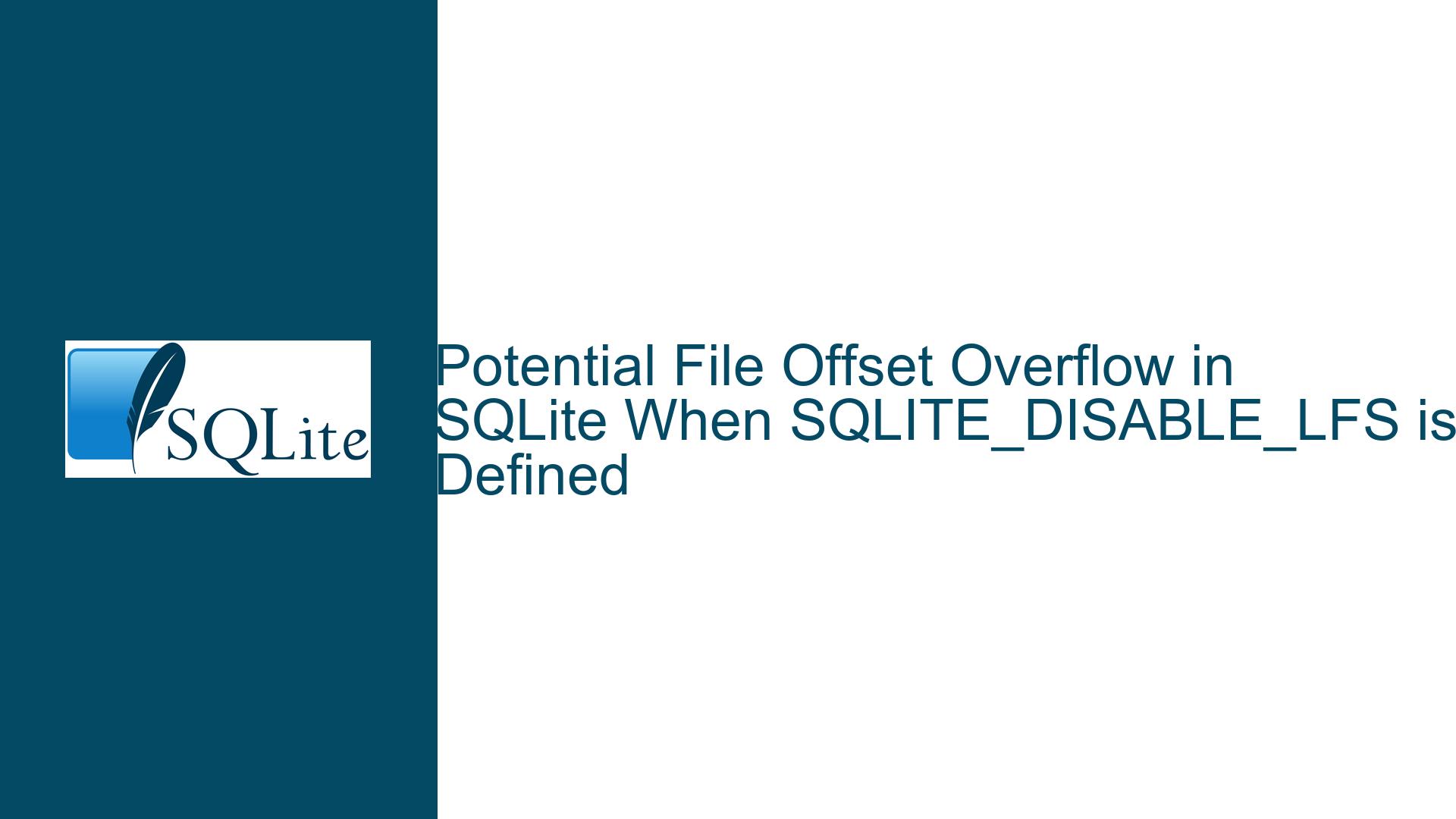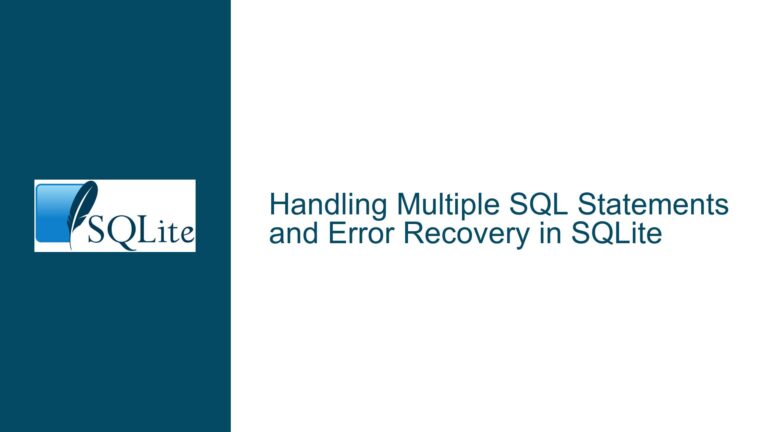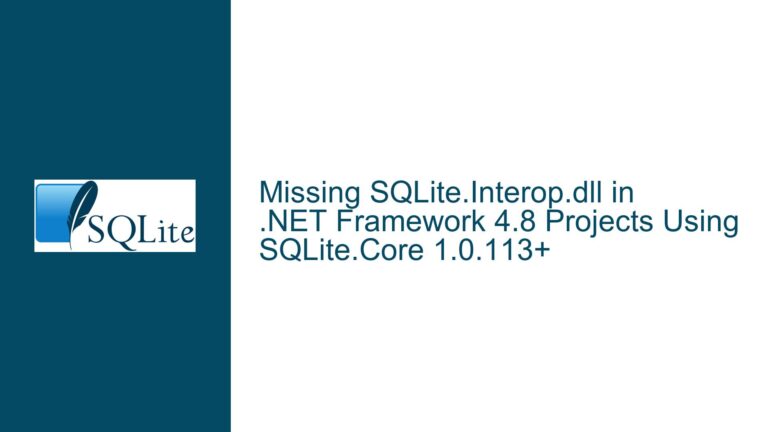Potential File Offset Overflow in SQLite When SQLITE_DISABLE_LFS is Defined
Interaction Between SQLite’s sqlite3_int64 Offset and System-Specific off_t Size
Issue Overview
The core issue revolves around the interaction between SQLite’s internal data types and the system-level file handling APIs when the SQLITE_DISABLE_LFS compile-time option is enabled. SQLite uses sqlite3_int64 (a 64-bit signed integer type) to represent file offsets for operations like pread, which is a POSIX function for reading data at a specific offset within a file. The pread function, however, accepts an off_t type for the offset parameter. The size of off_t is platform-dependent and influenced by compiler flags such as _FILE_OFFSET_BITS. By default, SQLite sets _FILE_OFFSET_BITS=64 to ensure off_t is 64 bits wide, enabling support for large files (files larger than 2 GB). However, when SQLITE_DISABLE_LFS is explicitly defined during compilation, SQLite skips this configuration step. On 32-bit systems, this can result in off_t being 32 bits wide, leading to a mismatch between the 64-bit offset provided by SQLite (sqlite3_int64) and the 32-bit off_t expected by the system. This discrepancy creates a risk of integer overflow when handling large files or offsets exceeding 2^31 – 1 bytes (approximately 2 GB). The overflow could manifest as incorrect file access, silent data corruption, or undefined behavior during I/O operations.
The problem extends beyond pread to any system call that uses off_t for file positioning or size reporting, such as pwrite, ftruncate, or lseek. The risk is particularly acute in embedded systems or legacy environments where 32-bit architectures are still prevalent. The absence of explicit overflow checks in SQLite’s codebase for this edge case exacerbates the issue, as developers relying on SQLITE_DISABLE_LFS might assume the library gracefully handles offset limitations. The crux of the problem lies in the implicit assumption that off_t and sqlite3_int64 are compatible in size when LFS (Large File Support) is disabled, which is not guaranteed across platforms.
Potential Causes of Offset Overflow in SQLite with LFS Disabled
The primary cause of the overflow risk is the explicit suppression of Large File Support via the SQLITE_DISABLE_LFS flag. When this flag is defined, SQLite refrains from setting _FILE_OFFSET_BITS=64, leaving the size of off_t to the system’s default configuration. On 32-bit Linux systems, for example, the default off_t size is 32 bits unless _FILE_OFFSET_BITS=64 is enforced, either via compiler flags or system headers. This results in a scenario where SQLite passes a 64-bit offset to a function expecting a 32-bit type, truncating the upper 32 bits of the offset. The truncation effectively maps large offsets into a smaller addressable range, causing misaligned reads or writes. For instance, an attempt to read data at offset 3,000,000,000 (approximately 2.8 GB) on a system with 32-bit off_t would result in the offset being interpreted as 3,000,000,000 modulo 2^32, which is 3,000,000,000 – 4,294,967,296 = -1,294,967,296—a nonsensical value that may trigger system call errors or access unintended regions of the file.
A secondary cause is the lack of compile-time or runtime safeguards in SQLite to detect or mitigate this mismatch. While SQLite is designed to be highly portable, its reliance on platform-specific behavior for low-level I/O operations introduces implicit dependencies on the underlying system’s file handling capabilities. When SQLITE_DISABLE_LFS is active, SQLite does not automatically restrict file sizes or offsets to 32-bit ranges, nor does it emit warnings or errors during compilation or execution when such limits are exceeded. This omission places the burden on developers to manually ensure that their applications do not attempt to access files beyond the 2 GB boundary—a requirement that may not be obvious, especially when migrating existing codebases to environments where LFS is disabled.
A tertiary factor is the variability in system-level implementations of off_t and LFS. Some systems, such as modern 32-bit Linux distributions, may enforce 64-bit off_t by default regardless of _FILE_OFFSET_BITS, while others, like certain embedded operating systems or legacy Unix variants, strictly adhere to 32-bit off_t without LFS. This inconsistency complicates cross-platform development, as the same SQLite build configuration might behave differently across target environments. Developers who disable LFS for compatibility reasons (e.g., to avoid conflicts with third-party libraries) may inadvertently introduce platform-specific vulnerabilities.
Resolving Offset Mismatches: Mitigation Strategies and Code Adjustments
To address the risk of overflow, developers must adopt a multi-faceted approach that combines compile-time configuration, runtime checks, and code modifications. The first step is to evaluate whether SQLITE_DISABLE_LFS is truly necessary for the target environment. If Large File Support can be enabled (by omitting SQLITE_DISABLE_LFS and allowing SQLite to set _FILE_OFFSET_BITS=64), this will ensure that off_t is 64 bits wide, aligning it with sqlite3_int64 and eliminating the overflow risk. However, in scenarios where LFS must remain disabled—such as compatibility with legacy systems or libraries that assume 32-bit file offsets—additional measures are required.
One critical mitigation is to enforce strict file size limits within the application layer. By capping database files and temporary storage at 2 GB, developers can prevent offsets from exceeding 32-bit bounds. This requires integrating runtime checks into file management routines, such as monitoring the current file size during write operations and aborting transactions that would exceed the limit. SQLite’s sqlite3_file_control interface can be leveraged to implement custom file size monitoring, though this necessitates modifying the application code to intercept and validate I/O operations.
Another strategy involves auditing the SQLite compilation process to verify the effective size of off_t when SQLITE_DISABLE_LFS is defined. Developers can use static assertions or compile-time checks to confirm that sizeof(off_t) >= sizeof(sqlite3_int64). If this condition is not met, the build should fail with an explanatory error message. For example, a configure script or build system could include a preprocessor check:
#if defined(SQLITE_DISABLE_LFS) && (sizeof(off_t) < 8)
#error "SQLITE_DISABLE_LFS is incompatible with 32-bit off_t on this platform"
#endif
This ensures that the configuration is validated early in the development cycle, preventing deployment to incompatible environments.
For existing applications that cannot enforce file size limits, modifying SQLite’s VFS (Virtual File System) layer offers a more advanced solution. By implementing a custom VFS that wraps file operations, developers can intercept offsets before they are passed to system calls and apply bounds checking. For instance, the xRead and xWrite methods of the VFS can validate that the offset does not exceed OFF_T_MAX (the maximum value representable by off_t). If an overflow is detected, the VFS can return an error code such as SQLITE_FULL or SQLITE_IOERR, prompting the application to handle the condition gracefully.
In cases where neither file size restrictions nor VFS modifications are feasible, cross-platform compatibility can be improved by conditional compilation. Code segments that handle large files can be guarded by checks for _FILE_OFFSET_BITS or OFF_T_BITS, allowing alternative implementations for systems with 32-bit off_t. For example:
#ifdef SQLITE_DISABLE_LFS
if (offset > (sqlite3_int64)0x7FFFFFFF) {
return SQLITE_TOOBIG; // Custom error code for oversized offsets
}
#endif
This approach requires careful integration into SQLite’s I/O routines but provides a clear failure mode for operations that would otherwise cause silent overflow.
Finally, developers should consult platform-specific documentation to determine whether LFS can be partially enabled without conflicting with other components. Some systems allow mixing 32-bit and 64-bit file APIs via feature test macros or linker flags, enabling selective use of larger offsets where necessary. For example, defining _LARGEFILE_SOURCE alongside _FILE_OFFSET_BITS=64 might resolve compatibility issues while retaining LFS capabilities.
By combining these strategies—enabling LFS where possible, enforcing runtime limits, modifying the VFS layer, and employing compile-time safeguards—developers can mitigate the risk of offset overflow in SQLite when SQLITE_DISABLE_LFS is defined. Each solution involves trade-offs between compatibility, performance, and code complexity, necessitating a thorough analysis of the target environment and application requirements.






